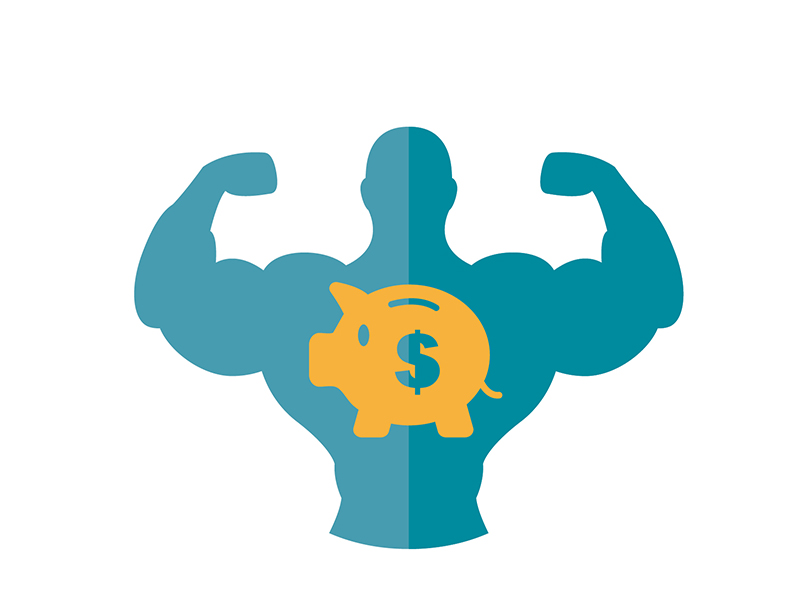Quick steps to long-term financial health
Most of our New Year’s resolutions involve physical fitness—eating less and losing some of the weight that crept on over the holidays. Debt, too, is insidious, but we love it; Americans are nearly $12 trillion in debt, according to financial research company NerdWallet. Analogous to physical fitness, financial fitness demands dedication and discipline. There is discomfort and disappointment, temptation, and plenty of opportunities to give up, but a commitment to meaningful changes in your money-management behavior is a priceless investment in your financial future. Here are some pointers to get you started.
Build a safety net
Don’t let a broken air conditioner or emergency vet bill derail you financially. Depending on your obligations, such as children and whether your spouse works, aim to save three to six months’ worth of living expenses to cover unexpected expenses. Keep the funds easily accessible in a high-yield savings account.
Prioritize your debt
First, set your goal. If you wish to reduce your number of outstanding debts, then minimize payments of higher-balance debts in order to more quickly eliminate lesser debts. If your priority is to pay less interest and you have the patience, tackle high-interest debts first, regardless of their size.
Look at yourself like a creditor
Under the Fair and Accurate Credit Transactions Act, consumers have the right to view copies of their credit reports from each of the three major credit-reporting agencies (Experian, Equifax and TransUnion) every 12 months without penalty and free of charge. Credit reports should be monitored regularly for errors and fraudulent activity, so space the three report requests throughout the year to quickly catch and correct any problems. If any erroneous or fraudulent activity occurs, you should immediately report the information to the appropriate credit-reporting agency. Pursuant to the Fair Credit Reporting Act, the agency is required to investigate the complaint within 30 days and correct any inaccurate information based on the findings of its investigation.
Use credit cards wisely
The average indebted American household carries $16,000 in credit card debt, according to NerdWallet. Making minimum payments, such a debt would accrue more than $46,000 in interest in the 58 years it would take to pay off.* A balance transfer to a lower-interest card or a card with a zero-percent APR offer can lessen financial strain by reducing or eliminating interest and allowing more time to pay off a debt.
Credit cards also can, and should, be used to make money. Credit card rewards, which are becoming increasingly competitive, can add up to hundreds or thousands of dollars in cash and benefits each year for items you were going to purchase regardless. Consider where you spend the most money and shop around for a credit card that fits your spending habits. International travelers can take advantage of cards, like the Chase Sapphire Preferred, which boasts 2x points on travel and has no foreign transaction fee, while families can earn 6 percent and 3 percent cash back on groceries and gas, respectively, with American Express’s Blue Cash Preferred card.
Create a budget
Tracking cashflow is a tedious but critical step in reaching financial fitness. If you need help, try an app like Mint, which links to your bank account and organizes expenses into customizable categories that help track where your money is being spent. Once problem areas are identified, create a budget to deter impulsive buying and overspending.
Invest
If your employer matches 401 (k) contributions, start there (hello, free money!). If possible, contribute at least as much as your employer matches. Otherwise, opt for an IRA or other tax-advantaged account to maximize long-term tax savings. Talk to a financial professional to determine how best to invest your funds. Note that the terms “financial advisor” and “financial planner” are both generic terms referring to anyone advising on finances in a professional capacity. Be sure your financial planner is certified by the Certified Financial Planner Board of Standards, Inc., which enforces strict ethical standards and ongoing education of its members.
Protect yourself
Most of us need some form of insurance. Renters should consider renters insurance, which protects against theft and natural disaster and averages just $15 a month, according to the Independent Insurance Agents and Brokers of America. Those with families should maintain life and disability insurance in the event of death, illness or injury.



